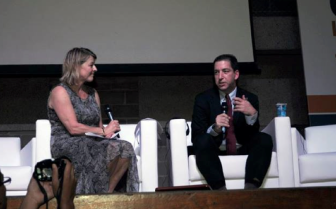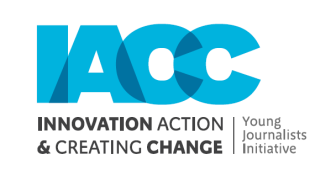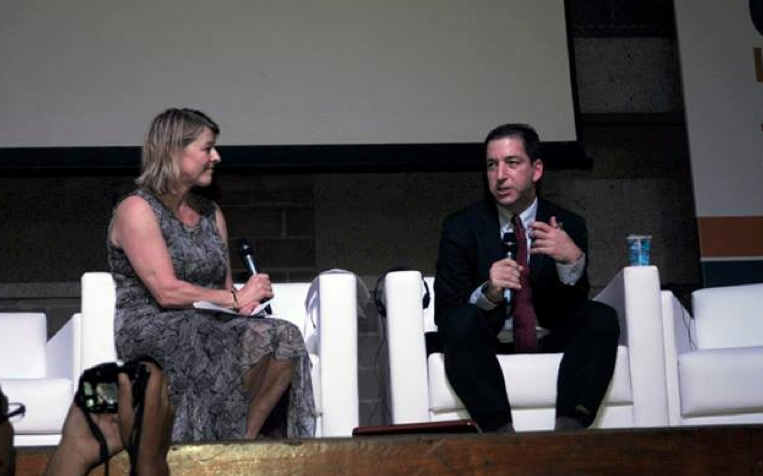
Glenn Greenwald, of The Guardian, at GIJC2013
The journalist behind, perhaps, the biggest story of a generation had strong words for Western media outlets and journalists who bow to those in positions of power.
“Journalism is corrupted,” Greenwald, a Brazil-based journalist, told hundreds of investigative reporters and editors at the 2013 Global Investigative Journalism Conference showcase presentation on “Surveillance and Secret Government,” Monday afternoon in Rio de Janeiro.
His prime example: A few months before the 2004 U.S. presidential elections, The New York Times agreed to withhold from publication a story revealing that the U.S. National Security Agency (NSA) was conducting unauthorized eavesdropping on U.S. citizens’ phone conversations. The Times made the decision after its top editors met with President George W. Bush, who they said made a convincing case that publication would endanger national security by disrupting on-going investigations and alerting terrorists under scrutiny. The newspaper eventually published the report, about a year later, just before one of its reporters published a book revealing the NSA activity.
“The idea that a major media outlet, (which) I thought of as part of the liberal guard…would suppress a story for so long shows a fundamental sickness of the Western press,” said Greenwald. “Rather than doing what they ought to have done they obeyed the dictator.”
Bill Keller, The Times editor at the time, said, “We published the story when we did because after much hard work it was fully reported, checked and ready, and because, after listening respectfully to the administration’s objections, we were convinced there was no good reason not to publish it.”
For the past four months, Greenwald’s stories about spying on citizens and governments around the world by the NSA have shaken the U.S. government, its allies and the sense of privacy among citizens. Snowden is currently in Russia under asylum, his U.S. passport revoked and facing criminal prosecution if he returns to the United States.
Greenwald said it was initially difficult to convince large media outlets to carry his stories.
“Large media outlets’ instinct is caution and fear,” he said. Eventually, he teamed up with The Guardian and other media outlets, including The Times, to publish stories from the NSA documents Snowden filched from the NSA while working for Booz, Allen-Hamilton, a major U.S. firm specializing in national security projects for the U.S. government.
Greenwald, who was a practicing attorney, said he was drawn to journalism after the September 11th attacks on New York City and Washington, D.C., feeling that journalists did not do enough to question the government’s subsequent actions, such as implementing the Patriot Act, which, among other things, permitted imprisoning “enemy combatants” without the usual legal rights and privileges accorded under U.S. and internationals law.
Greenwald said it’s time to question established rules about journalism, such as how close a relationship a reporter and source can have and whether you can express an opinion on a story.
“I don’t know who wrote these rules, where they come from,” he said. “But what I do know is these are the rules that are abided by a profession that’s become extremely corrupted. So the fact that there are rules that this profession abides by is not a reason for me to abide by them.”
He added that there is good reason to challenge those old rules of the road and, additionally, he supports Snowden’s decision to release the NSA documents and he denounces the U.S. government for taking criminal action against Snowden.
As for the state of the profession, Greenwald believes journalism is in a “golden age,” even though some of the profession’s largest institutions are experiencing tough times because of the changing way people consume news.
“The media institutions are failing and it’s a great thing to celebrate. It’s good because it’s forcing institutions to reexamine how they function and they’re becoming better as a result,” he said. “Journalism isn’t dying. It’s thriving and just going to other places.”
And he said people should care that they are being watched.
“You really lose a vital part of human freedom when you are being surveilled.“

Ryan Hicks reports on this event as part of the IACC Young Journalists Initiative, a network reporting on corruption around the globe.


“Greenwald, who was a practicing attorney, said he was drawn to journalism after the September 11th attacks on New York City and Washington, D.C., feeling that journalists did not do enough to question the government’s subsequent actions, such as implementing the Patriot Act, which, among other things, permitted imprisoning “enemy combatants” without the usual legal rights and privileges accorded under U.S. and internationals law.”
This is incorrect. Greenwald starting writing after the 2005 NSA story, not after 9/11. And the PATRIOT Act does not have *anything* to do with “enemy combatant” status or indefinite detention.
Greenwald is the REAL DEAL and thank God for him! Millions of us “average” citizens noted a “purge” of editors, journalists, anchors and “personalities” in all forms of media immediately after 9/11 and continuing for years. You can bet that anyone who challenges the status quo will ultimately be “let go”. It seems that the vast majority of those remaining are the suck-up – SELLOUTS and the world suffers considerably for their avarice and lack of professional ethics!
Thank you Mr. Greenwald for your bravery and your dedication to Freedom of Speech. beholdapalehorse.tv